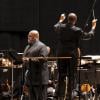
Not many know the story of Elijah Parrish Lovejoy, a young editor and preacher whose fiery and fearless denunciations of slavery led to his murder by a mob in Alton, Illinois, in 1837, 24 years before the outbreak of the Civil War. But that will change when Elijah’s Call: An Oratorio for an Abolitionist has its world premiere on Nov. 3 at the Palace of Fine Arts in San Francisco.
Composed by Allison Lovejoy, who also wrote the lyrics with author and journalist Gary Kamiya, the work will be performed by the Golden Gate Symphony Orchestra & Chorus, conducted by Music Director Urs Leonhardt Steiner.

The San Francisco-based Lovejoy, also a pianist who has performed internationally, is in fact a distant relative of the preacher. Composing the oratorio, she explained, “came from an inspiration that I had about five years ago when I found out that Elijah Lovejoy was in my family line. My father’s sister was doing a family tree, and she pulled out articles and papers that sourced back to the original Lovejoys of Massachusetts.
“I kept this on the back burner,” she continued, “until Jack Hirschman — he was the poet laureate of San Francisco [from 2006 to 2008] — said, ‘Do you know about Elijah Lovejoy? He was an advocate for freedom of the press and an activist?’ [So] I kept researching him online, and Gary and I found a lot of articles and publications and [also] went to St. Louis and looked at transcripts of his papers and responses on microfiche.”
The San Francisco Arts Commission gave them a grant to support further research, and Lovejoy and Kamiya began working during the COVID-19 pandemic. Lovejoy said, “Two significant events gave us room to do this: One was the pandemic, and the other was the murder of George Floyd and the reaction to it.
“We had already started looking at the parallels within the story of Elijah’s life. This made us think about how we wanted to approach it, how we wanted to use the message of resistance and standing up for social justice.
“The main aria framed our vision of how to structure the entire piece, but the most difficult thing was to narrow down all of this research without making it feel like it was a history lesson [and] without losing the integrity of Elijah’s life.”
With a run time of about an hour, the oratorio is scored for a 50-to-60-piece orchestra, a 60-to-70-person choir, and three soloists: tenor Michael Desnoyers, baritone Bradley Kynard, and alto Melinda Martinez Becker. Walter Riley, an Oakland-based attorney and activist, serves as the narrator. Also on the program is Florence Price’s Symphony No. 4, and Oakland’s Acts Full Gospel Church Men’s Choir, directed by Chris Poston, will sing African American spirituals.
“I’ve known Walter and his family for years,” said Lovejoy. “I taught his wife and grandchildren piano. I’m also familiar with his son [film director, rapper, and screenwriter] Boots Riley. This is Walter’s first time performing, as it is Gary’s first time being a librettist. Walter has a beautiful voice, and he’s a fierce person but a gentle soul.”
Lovejoy has also worked with the Golden Gate Symphony Orchestra & Chorus, which was founded by Steiner in 1994, for some 25 years. She said that the oratorio brings several styles together. “I’m influenced by Handel and classical and romantic music, as well as 20th-century composers [Leonard] Bernstein and [George] Gershwin. I hope [my style] reaches a broader spectrum of listeners.”
Lovejoy wants “the audience to leave with a feeling of inspiration. I’m using this story as a model to fight for justice, [and] I would like people to leave with a feeling of coming together. We’re all in this together, [so] let’s move forward as one.”



